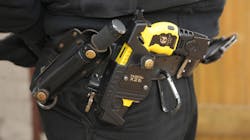San Francisco Police Officers to Get Tasers
By Vivian Ho
Source San Francisco Chronicle
SAN FRANCISCO -- The San Francisco Police Commission approved the use of Taser electroshock weapons late Friday for the Police Department, an issue that has been debated and rejected in the city for 13 years.
Following an almost seven-hour meeting interrupted by a protest that led to a lockdown of City Hall, commissioners narrowly passed a measure that the police officers union and several past city chiefs have long called for but activists and police critics have strongly opposed.
While members of the department’s top brass remained straight-faced during the hard-fought, 4-3 vote in favor of the plan, activists outside the chamber began chanting, “Shame! Shame!”
The San Francisco Police Department is one of the last major city forces in the country without the devices, in part because of the opposition from community members concerned about the weapons’ lethality and the potential for abuse.
But those in favor of Tasers, including police Chief Bill Scott, who took command in January amid controversy over a series of officer-involved shootings, say officers need less-lethal alternatives to firearms and Tasers provide such an option.
On Friday, Commissioner Thomas Mazzucco echoed Scott’s sentiments on the weapons, citing the findings of the U.S. Department of Justice’s community-policing division for why he voted to allow Tasers. In a report last year, the Justice Department said San Francisco “should strongly consider” giving officers stun guns.
“They could not believe we did not have these,” Mazzucco said. “They believe it will save lives.”
The report was the result of a six-month review of the San Francisco force after officers fatally shot Mario Woods in December 2015. Woods, a stabbing suspect who was still carrying a knife, was shot while shuffling slowly along a Bayview neighborhood street, after efforts to subdue him with beanbags rounds and pepper spray failed.
The killing is still under investigation, but following the shooting, the Police Commission revised the department’s use-of-force policy to put more of an emphasis on the sanctity of life, deploying de-escalation tactics and using force as a last resort.
“De-escalation has been a topic that the San Francisco Police Department has taken very seriously,” Scott said Friday, as he made his case for Tasers. “The reality is there are times when de-escalation does not work and officers have to use force as safely as possible. We have a duty to reduce injuries to residents and officers when these type of incidents occur.”
But Commission President L. Julius Turman, who voted against the measure, said he felt that equipping officers with Tasers “will derail the progress we have made.”
Commissioner Petra DeJesus, who has long opposed Tasers, had harsher words.
“Shame on this commission for even thinking to vote on this,” she said. “We should give our (policies) a chance to work.”
While Friday’s vote did not delve into policy for Taser use nor into the implementation, Chief Scott has said he wants all sworn officers to be equipped with the weapon. As part of the vote, commissioners said officers could not begin using the weapons until December 2018, after the new use-of-force policy has been in place for two years.
Commissioner Sonia Melara said she received about 100 letters in support of Tasers from community members, and a handful spoke at the meeting. But dozens more spoke in opposition. Activists speaking out against Tasers shut down the meeting for about an hour and prompted deputies to lock down City Hall.
“Please try (a Taser) on yourself before you make the decision,” activist Maria Cristina Gutierrez said just before she went beyond the two-minute allotment allowed for each speaker during public comment and Turman called the meeting into recess.
The activists remained in the room, chanting and making speeches against the weapons, as the commissioners filed out and reconvened in another room.
Turman called the meeting back into session without informing the community members still in the original room — a move that was widely criticized — and reopened public comment by bringing in five people at a time who were “not involved in the disruptive behavior.”
In this year’s discussion, opponents have shifted their focus from past deaths linked to the devices to their effectiveness. Critics have brought in experts to speak to commissioners about the failure rate of Tasers — and what that means for an officer and a subject in an escalating, perilous encounter.
Many balked at the city budget and legislative analyst’s estimate for the overall cost. The low estimate for obtaining Tasers — in a scenario in which some but not all officers get them — was $2.8 million, which includes the cost of the devices as well as officer training, instructor training, testing and defibrillators. Ongoing, annual costs for the low estimate came out to just over $400,000.
The high estimate, which is based on equipping and training all sworn officers, was $8 million in one-time costs and annual costs of about $750,000.
The analysis did not include the cost of litigation that could come as a result of injuries or deaths because of Taser use by a city officer.
Commissioner Joe Marshall, the longest serving member on the panel, commented that he has served on the commission through all 13 years of proposals regarding Tasers.
He said he supported the chief in what he wanted, in part because from his experience, he learned there was no “right time” to equip officers with Tasers and that after 13 years, it was time for a decision.
“People just don’t like Tasers,” Marshall said. “I heard the statement that it will never be the time to have them. Time does not matter to me. There is no ‘the time.’ You have to decide whether to have them or not.”
Vivian Ho is a San Francisco Chronicle staff writer. Email: [email protected] Twitter: @VivianHo
———
©2017 the San Francisco Chronicle
Visit the San Francisco Chronicle at www.sfgate.com
Distributed by Tribune Content Agency, LLC.



